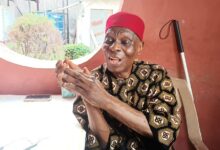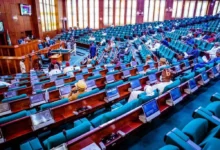
MCHIRIAKI: Palm kernel shells, after the inner nuts have been removed.
Mchiriaki is dumped on a muddy pathway or road to create traction.
Mchiriaki is also used to start fires and as firewood.
ISI AKWỤ: A semi ball-like head to which palm fruits attach. It can weigh up to 40 pounds depending on the type of oil palm tree.
Isi akwu is found at the very top of oil palm trees, generally more than five, and sometimes up to six fruit bunches can be harvested from one tree at the same time
IZEGBE AKWỤ: Male and female flowers of the oil palm tree. Oil palm trees are cross-pollinated crops with both male and female FFBS.
The male flower fertilizes the female flowers. The female flowers produce bunches (Isi akwu) and the male flower, after fertilizing female flowers, becomes what we call Izegbe akwu. Izegbe akwu is used to make Uri Oku.
AKI: Kernel. The inner nut of the palm fruit.
AKINKO: Unripe oil palm fruit with a soft whitesweet kernel.
AKI OKPURUKPU: Large size palm kernel.
OGWO NKWỤ: Palm tree trunk. Ogwo akwu is used to build bridges.
Ọhia AKWỤ: Community-owned oil palm trees. Ọhia akwụ denotes public or community ownership.
ABO NKWỤ: Palm tree plantation. [Abo is a term use to denote privately owned palm tree plantation.]
AKIRIKA: Dried-palm tree branch, with its numerous leaves.
AZIZA: Broom. The stripped palm stems used to sweep.
EMERE NKWỤ: Extractions from the branches of Osukwu palm tree that are twisted into a very strong rope. Emere is used in the production of Mbagu. Emere is also used when an item to be secured (tied) is heavy.
MBAGU/Okpoko: An instrument used for climbing oil palm trees.
Ogbu Nkwụ : A man who is skilled in the act of climbing and harvesting oil palm tree fruits (bunches) for fees.
IKWO L’ODU AKWU: The mortar and pestle used to pound palm fruits. Usually larger than the regular everyday mortars.
ISU AKWỤ: The process of pounding cooked palm fruits to prepare it for oil production.
IPU AKWU: The process of squeezing out red palm oil from the pounded cooked palm fruits.
ITU AKWU: The process of separating palm kernels from avuvu, after oil has been extracted.
NMA AKWU: A metal instrument used to separate palm kernels from avuvu during the process of oil productions.
AVUVU: A fiber from palm fruits after oil and the kernels have been removed—waste. Avuvu is used to start fires during the rainy season when firewood is wet.
MANU AKWU: Red palm oil.
OGURU MANU: Residual, off-color (yellowish) oil.
IGBI AKWU: Impurities found in palm oil. Igbi is the accumulation of variousfragments of tiny broken avuvu, kernel shells, water and oguru. These particlespass through a strainer during palm fruit processing for oil. These tiny particlesare mixed with oil. Igbi is removed from the oil through a special process. TheIzegbe into Uri Oku.
ISI AKWU: Fruit bunch. (See above).
MKPURU AKWU: Oil palm fruits.
OGBILI AKWU: Empty fruit bunch. A large semi-ball-like head from oil palm tree, to which the palm fruits attach. When the fruits are removed from it, the shell is known as Ogbiliakwu. Ogbili has many traditional uses in our culture.
NTU OGBILI: Ogbili ashes. Ogbili ashes are usedin making bathing soap, called Ncha akpala orSabulu. This soap is known for its medicinalvalues. Ncha akpala is use to cure some formsof skin disease.
OGARA MAYI AKWU: Oil palm sap. Sweet palm wine. The sap is very sweet and contains a little alcohol when it is first taken from the palm tree. But the longer it sits, the more it ferments and increases in alcohol strength.
OKU AKWU / NKWU: A man who is skilled in the act of oil palm Wine-tapping. Through a special process, the tapper collects the sap which is very sweet and contains alcohol. This sap is known as mmanya Nkwu [palm wine].
IGWO (IGWE) AKWU: A machine used to process oil palm fruits into red palm oil.














